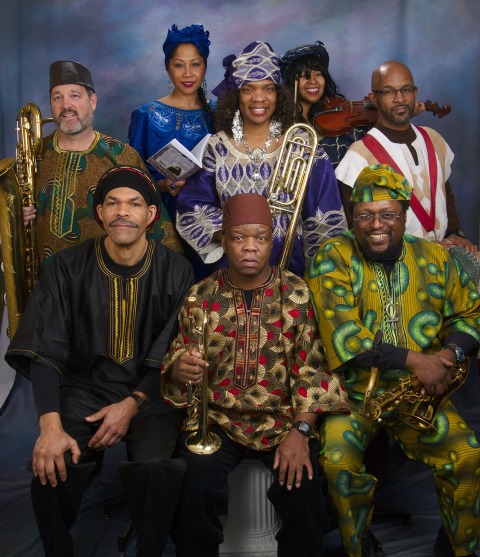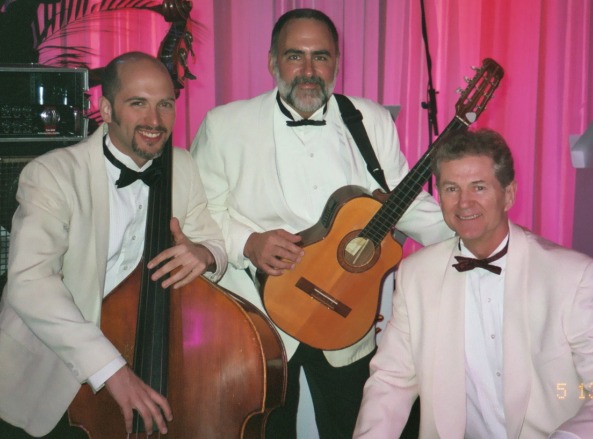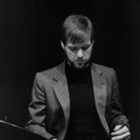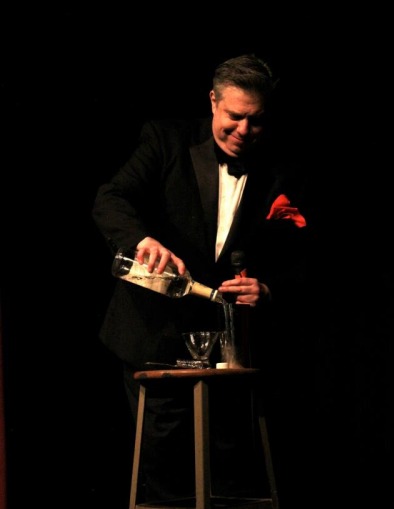In The Tradition Jazz
In The Tradition Jazz started performing in 1993. At its inception the band performed regularly at Drew’s pub on the west side of Detroit, and was recognized as a formidable Hard-swinging Bebop ensemble that was faithful to the classic Bebop tradition and featured unique originals.
In The Tradition Jazz performances
In The Tradition Jazz has performed at the “Arts, Beats, and Eats” Festival in Pontiac Michigan, the “Black Star Community Festival” in Detroit, Baker’s Keyboard Lounge, The Detroit International Jazz Festival, and the “Detroit CitiFest” Just to name a few of the venues in which it has appeared. In December 2007, In The Tradition Jazz was the orchestra that backed the stage show “ The Spirit Of Hitsville “ , a musical tribute to Motown Record Corporation that premiered at the Gem Theater in Detroit. Since then, the band has gone on to perform at various music festivals throughtout southeastern Michigan and Ohio, and has received invitations to perform throughout the United States.
In The Tradition Jazz albums
In 2009 the group released it’s third recording to wide international acclaim. They were selected “Artist of The Week” by SkyJazz International for the week of March 8, 2010. On the heels of this recorded activity, in 2012 In The Tradition Jazz released it’s fourth album. This double disc recording has been praised as one of the top jazz sub genre recordings of 2012. Both of these recordings were widely accepted on playlists around the world, and received spectacular reviews in Cadence Magazine, Dusty Groove, and many other venues.





-The Origins Of Jazz Explored At Arts Center-
By Michael S. Lee
Of The Commercial Staff
An educational component of the Novel T’s Pine Bluff Summer Jazz Festival Saturday mixed a lesson in music history with quintessential jazz rhythms. Entitled “Jazz: From Africa to America, an African People’s Music,” the event was held at the Arts & Science Center for Southeast Arkansas and hosted by Stuttgart native Olujimi Tafataona.
“Jazz is an African music created by African people in the western hemisphere yet the original identity of those who created it is often blurred,” said Tafataona, who plays alto, tenor and soprano saxophone in the Detroit, Mich., jazz group In The Tradition. “We are the foremost Africa-centered jazz group. The genesis of the music we play goes back to blues as well as rhythm and blues. Jazz is an offshoot of those musical traditions.”
Tafataona quoted Duke Ellington. “It don’t mean a thing if it ain’t got that swing,” Tafataona said. “What did he mean by that? It’s all about the rhythm of the music. Let me show you how that works.”
Tafataona motioned to Darnell Henderson Jr. of Pine Bluff who stood ready to play his bass guitar. “Give us a good bass line,” Tafataona said as Henderson began laying the instrumental framework for what was yet to come. Tafataona next turned his attention to Larry Brooks of Little Rock on drums. “Give us some more,” Tafataona said as Brooks began to use his drum and cymbal set to create music that was undeniably jazz. “Oh yes. That’s it. You know what that is. There’s no question.”
Tafataona added his alto saxophone to the mix followed quickly by E.C. Brown of Dallas, Texas, on the electronic keyboard. “That’s swinging; that’s poppy,” Tafataona said after the four jammed together for several minutes. “What makes a musical style is the rhythm. African people brought a sense of poly-rhythm to the western hemisphere. The indigenous people were mono-rhythmic.” “The bossa nova, the salsa, the samba and the rumba were all created by some of the more than 160 million enslaved African people brought to this hemisphere from Canada to the United States to Mexico to Colombia to Brazil and Argentina,” Tafataona said.
The jazz quartet played a rendition of Canadian Sunset with Tafataona switching out his alto saxophone for his tenor sax. “The people of the West Indies were also critical to the development of African music in this part of the world,” Tafataona said. “The Afro-Cuban drumming societies were incredible. What you had was a cross-pollination of different African styles throughout the western hemisphere.” “There is no such thing as Latin jazz,” Tafataona said. “With Latin you are talking about the language of the Catholic Church and not about a race of people.”
The jazz quartet next performed Jungle Strut by Gene Ammons featuring a syncopated rhythm on drums. The event was part of the seven day Pine Bluff Summer Jazz Festival sponsored by Novel T’s in Pine Bluff owned by Kenneth Scott Fisher and Sandra Fisher.
-Detroit Jazz Magazine, Oct. 16, 2013-
By Matt Ward
Several articles ago when I wrote about the New York-based R&B vocalist Milton Suggs, I began my concluding paragraph by stating “Black American music and culture is a genuinely American product.” Of course reading that whole article would do very much to take some of the stink of magnanimity and vacuousness off that sentence, now a little bit wiffy read out of context. But I don’t think it too implausible a claim to stake that the edifice that is modern popular music got its most significant contribution from Black American jazz, gospel, R&B, and early rock & roll. Indeed my beloved British Invasion classic rock (and after that, heavy metal) wouldn’t exist if not for the likes of Little Richard, Muddy Waters, Howlin’ Wolf, and Chuck Berry–to name a few. But music, as is life, is constantly evolving; today’s cultural ambassadors are the beneficiaries of those who came before them, and so on in either direction. Whose shoulders did those artists stand on? And whose before them? Well, that has been for twenty years, the focus of Olujimi Tafataona, leader of the Detroit-based jazz ensemble called In The Tradition. And as their name might suggest, this band’s métier is straight-ahead Jazz, unplugged and resplendent in all its acoustic simplicity and textural earthiness, and underpinned by rhythms inspired by all parts of the far-flung reaches of the African Diaspora—(more on that in a moment.)
In The Tradition’s latest album, Sirius (named for the lynchpin star of Canis Major, not the prisoner of Azkaban) is a double-album; a two-disc, eighteen-track epic. My attention generally starts to wander if there are more than six songs (Jeff Beck albums have spoiled me in that regard), but this album commands one’s attention from the start, with the rhythm section painting bold, primary colors, and the horns expressing the crossed tees and dotted eyes of Tafataona’s masterful arrangements, with details culled from such diverse influences as (African) West Coast Ska, Rwandan and Peruvian Africans, rhumbas & sambas, bossa nova, and Bebop above all. I found myself strapped in for a mind-opening cultural trip, and by journey’s end I was in the throes of a mild identity crisis.
My biggest (and possibly only) pet peeve with digital media is the terminology. For instance, I have to speak of Sirius in terms of ‘Disc 1’ and ‘Disc 2’, which is flat-chested antiseptic phrasement compared to A-Side and B-Side, long since made irrelevant by optical media, and even more by packageless (cloud-based) media which has made even references to ‘albums’ seem geriatric. Nevertheless, let’s make-believe and say that the B-Side of Sirius opens with “She Sings to the Wind (With Feeling)”, which features the sultry impassioned moans of vocalist Imari Akua Jendayi, whose voice ululates so sweetly here that you’d swear her epiglottis was dipped in honey. It was the track that introduced me to the band, having first been tipped off by the higher-ups that I was reviewing an African jazz band—but the song instantly put me in mind of Miles Davis’ “All Blues”, with a shuffling gait about it that seemed so primal I must’ve heard it in the womb at some point. In The Tradition’s hand-percussionist Kefentse Chike breaks it down: “If we go back before Jazz, jazz grew out of the blues. Blues grew out of the field shouts and work songs African slaves used on the plantations. Those music styles and genres were carryovers from Africa.” Maybe the reason I didn’t register it as specifically ‘African’ or pertaining to any part of that massive and massively diverse continent, is because it was part of the soup I’ve been swimming in all along, musically at least. And Mr. Tafataona would surely agree. “The thing to listen for in our music,” says Tafataona, “is… always listen to the rhythm section. Listen to the bass, listen to the piano, and both drummers. If you’re able to focus in on that, you’ll get to the core of what we’re about.”
The group that would eventually become In The Tradition began in late eighties Detroit in the Neal Henry Septet, when in 1993, five of the closer-knit members — Tafataona (then Christopher James) on alto & tenor sax, Foluke (Brad) Shearer on piano, Charles Hopkins on trumpet & flugelhorn, Brandon Parker on drums, and the late Robert Allen on bass — broke off to form the Christopher James/Charles Hopkins Quintet. Tafataona, born and raised in Stuttgart, Arkansas, and with part of his childhood spent in Phoenix, Arizona before his family finally moved to Detroit, received at a very early age a musical and cultural cross-pollination including Latin-American music of the Southwest, the Motown sounds of the family phono, and possibly most significantly the culture of Southern Baptist, and African Methodist Episcopal Churches while in Arkansas. From the liner notes of Sirius: “Olujimi loves African people.” He is dissatisfied with our condition and lack of real power throughout the world, yet he has the great hope that we will rise like Sirius, the “dog star” that gives this album its name.” Through the works of In The Tradition, and with four albums to date, he seeks to educate listeners around the world about the African story, and hook the culturally disenfranchised members of the ‘Diaspora’ back into their heritage, laying on them his ensemble’s refined expression of African-American classical music (read: Jazz), in as authentic a presentation as they can muster.
How authentic is that? Well, percussionist Kefentse Chike, a professor of African Studies at Wayne State University may be able to answer that, but this article hasn’t the space for one of his dissertations… In fact, all band members—in ITT’s current manifestation, ten in all—have some form of classical musical education, as well as an unquenchable thirst for their own cultural history. Imari Akua Jendayi adds, “All of [the band members] have worked with different masters, including well-known local masters, and I consider ourselves an outgrowth of those artists of that period.”
However I, as an admittedly disenfranchised member of the Diaspora, piqued Mr. Tafataona’s interest when I happened to say of his band, “Well, you guys are all Americans…” “…In citizenship, yes” said Tafataona. “But, you called yourselves Africans…” I said. Foluke Shearer chimed in, “If you pulled a Japanese-American off of the street, what culture do you think they would distinguish themselves as being?” I said, “Ah, but how many interracial relationships and generations removed before that distinction becomes muddied?” Shearer said, finally “This is who we are! We’re African people living in America, with American citizenship, but that never stopped you from being African in your heritage. And you know what? Everybody else knows it, except us.” Up until that point, I had already built a personality for myself based on my 20th-century, middle-class suburban Washingtonian upbringing, not to mention my Western education based on Enlightenment-era values, and my love of science, and was having a jolly good time getting lost in the 21st-century cultural supermarket (sampling among other things, Japanese culture)—and now with this bucket of cold water to the face… “Yes, I know I’m Black,” I thought to myself. “But African?” Why did I find that notion, that word, so… offensive?
Two main reasons, one pertaining to what “African” has been made to mean in the modern West (largely as a result of my aforementioned 20th-century Western education), and the other to do with the fact that “African” has meant different things to different societies at different points in time. The early Roman Republic in the 200’s BCE saw the odd exotic Negro—(odd, because our kind lived mainly south of the Sahara, which in antiquity really was like crossing the devil’s anvil; exotic, because Black was beautiful even back then), but more commonly identified Africa with the Semitic civilization of Carthage, in what is now Tunisia. When asked about from what specific African cultures In The Tradition derives its creative nourishment, Mr. Tafataona said, “We claim all of it. Being of African heritage, that entire continent belongs to us; every aspect of it is ours, and we draw freely and liberally from it.”
I have done, and will continue to throw my hands up and say that the depth of my own African cultural education is wanting compared with the members of ITT, but I needn’t a doctorate to notice that their project is trying to promote blackness—in large part—by making the Black African story the maypole of all African stories. I find that troubling, as it implies that Blacks can lay claim (by some degrees of separation) to Hannibal’s elephant-powered charge over the Alps, or to the design and construction of the Pyramids of Giza. No hard feelings to “300” fans, but it just isn’t true. I do understand the urge to stake such claims, though. In spite of the fact that the whole world indulges in American cultural exports, a significant portion of which have been the direct brainchildren of Black creators, and nearly the whole pie (as music is concerned) seasoned to varying degrees by Black American forebears… and in spite of numerous blacks in positions of power at all levels of government, right up to the First Family, it doesn’t feel like we’ve accomplished very much at all for ourselves. —That can also be understood, if not forgiven, as Black Americans are among the most rapidly naturalized former slave populations in the world, and the burning embers of that sordid history are just beyond living memory. (Indeed, the social psychological product of that era is well within living memory, on both ends of the fire hose.)
Part of the mission of In The Tradition is the compilation and forging of a Pan-African cultural digest; a sort of personal racial history, wrought in order to rebuild lines of dignity and tradition which were systematically destroyed and suppressed during the American era of slavery. You don’t have to be black, or African, to enjoy Sirius, which is as fine an example of straight-ahead Jazz as I’ve heard in recent years. But ITT’s goals make for an esoteric market, and that’s largely because non-Africans tend not to pay very much attention to anything–whether cultural export or breaking news–listed under an explicitly “African” label. I was surprised to find such apathy shared even amongst some of my own relatives, when I brought Shearer’s argument to them and subsequently had it blown back in my face (much in the same way I rebuked him, in fact.)
One determined jazz ensemble cannot turn all of that negative psychology around, but a personal listen can at least help to put your mind in the right place, and Sirius’s penultimate groove, “A Pan-Afrikan Prayer (Bridge to Tomorrow)” is the album’s cathartic anthem piece. It’s so good that it might just be worth buying if only for that one track, which at nearly fifteen minutes, and played on a home hi-fi, you’d be getting your money’s worth. My ceiling joists were humming to the song’s plummy bassline, plucked by Gregory Cook, and in itself a more marvelous arrangement than most any electronic squeal, blip or bang popular music can render. As it persisted, it induced within me a zen-like state… soon combining with drums, congas, piano and horns to become an extremely effective conveyor belt for Aurora Harris’s confrontational poetry to roll in, and drill ever further into my noggin.
As someone who ruminates about my racial group’s lack of a clearly defined cultural history on a regular basis (and the lack of standards and dignity that void causes), Harris’s words seemed like some of what I’ve been waiting to hear for so long. When she said, un-pompous and with unequivocal devotion, “Our Blood is the wind and current of Oceans,” by Bog I wanted to believe it! Harris thenceforth set about my cultural misgivings and inhibitions with an emotional jackhammer:
My name is Negritude, my name is Negrismo, my name is the Harlem Renaissance… They say I am a people from a time gone by, And now they call me “Filled Urban City,” They call me poor, they call me “At Risk,” They call me broken home, they call me “No economic development in 50 years”… Has anybody seen my history? Has anybody heard my history? Has anybody seen my greatness? What happened to my mind, what happened to my life? What happened to unity, and community? What happened to self-determination? What happened to creativity? What happened to saving each other? S.O.S., It’s time to save ourselves…
“A Pan-Afrikan Prayer” is a singular illustration of In The Tradition’s core desires; it is a call of self-awareness, and of self-preservation to all African-Americans (in Olujimi Tafataona’s words, Africans living in America) to recognize their heritage, be proud of it, and to start loving themselves. That is difficult for many of us, as “African” is the dustbin of the Western subconscious, in which has been tossed hundreds of years of irrevocable sins, broken promises, unfinished projects, and intractable political strife. Pianist Foluke Shearer hammers the point home: “To recognize who you are, is not an indictment of racism. One of the problems we’ve had in this country in identifying ourselves, is that we’ve been taught that if we do, then we’re somehow racist or hateful. We’ve been taught to feel guilty about knowing who we are, even though everyone else has the freedom to claim who they are.” On that, we couldn’t agree more. But when it came to A Pan-Afrikan Prayer’s closing chant, “Sing it loud, I’m AFRICAN proud!” I couldn’t quite bring myself to repeat it without becoming hopelessly pedantic: “Sing it loud, I’m so-many-generations-removed-and-I-don’t-even-know-which-West-African-tribe-or-civilization-my-ancestors-were-shipped-from-but-I’m-working-on-trying-to-solve-that-so-I-can’t-say-I’m-proud-of-being-something-I-don’t-even-know-what-it-is-I’m-being-proud-of, but thank you.” That was hard, too. After Ms. Harris’s soul-blistering testimony, you almost have to follow her.
For me personally, accepting my genetic lineage takes little effort, because it’s a scientific fact that is, for the moment, irrefutable. Embracing a cultural lineage however requires one to fall in love with it, especially now since our world, our universe, has changed forever. Personal histories of the type that Tafataona and his crew are working to rebuild have been the wellsprings of dignity for all peoples worldwide, before the age of rigorous empirical analysis, allowing them the comfort of stories with which they can trace their blood back to a mythical beginning, in which the Cosmos recognizes their existence. (What is it all for, after all, if nobody’s watching us?)
What In The Tradition has done with their music, is beautiful. What they intend to accomplish is important. But culturally, I am very much in love with the here and now, where unfortunately all personal histories are in danger. I am frustrated by the fact that we must march naked into the 21st Century without this emotional armor, which we were nonetheless destined to shed anyway. The world has changed, but our basic needs have not. At the end of the day, we still have to love ourselves, however possible.
From The Desk of Arthur Bowman Jr. –
Christmas arrived early to those in attendance at Mayflower Jazz series last night! Maxine Michaels was our slinky Santa Claus! She gifted us with a 9 piece band called, ‘In the Tradition,’ and they were wonderful! As the name suggests, this band has a political conscience. They named one tune for my friend, the late political activist Chokwe Lumumba. Their gifted singer, Imari Akua Jendayi, sang a song with the refrain, ‘Is there one out there for justice?’ The musicians were outstanding. For example, they could seriously swing in a 6/8 time signature, which aint easy! They would play the song’s theme with 4 horns and the solos were vibrant. I particularly enjoyed the trombonist, Kenneth Gill , and Mark Berger on baritone saxophone. Which is in no way to slight their leader, Olujimi Tafataona, saxophonist/flutist and arranger, who obviously inspired the whole thing! I recall last Dec.’s Mayflower Jazz offering being outstanding, so Maestro Michaels must make it her business to end the year with a bang, which is what she did last night. Thanks Max and Mayflower Jazz.